
The Best New Nonfiction to Read This November
From Ski Bums to Jazz Age Madams to Postwar Bohemians
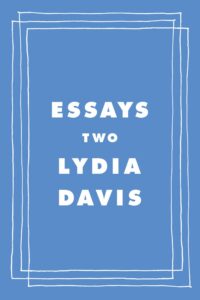
Lydia Davis, Essays Two: On Proust, Translation, Foreign Languages, and the City of Arles
(Farrar, Straus and Giroux)
Essays Two, Lydia Davis’ follow-up to Essays One—which offered the author and translator’s reflections on reading, writing, and engaging with art—delves into her relationship with translation and language-learning. To read Essays Two is essentially to sit beside Davis as she works, and she’s a generous teacher: a longtime translator of French (in particular of Proust) who has also worked in Spanish, Dutch, German, Portuguese, and two Norwegian languages, Davis’ thoughts in this area are extensive, well-informed, and illuminating. For readers with experience translating literature or those who have learned another language, this is a gold mine: Davis drills down to the minute details, doubts, and decisions that comprise the bulk of translation work, inviting the reader to engage with what is, often, an unavoidably solitary process. Even readers who have no language-learning or translation experience will find plenty to think about here, as Davis’ meditations on these topics often veers into cultural analysis, writing techniques, history, and her own personal stories. –Corinne Segal, Lit Hub Senior Editor
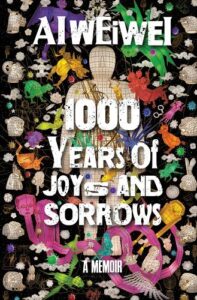
Ai Weiwei (trans. by Allen H. Barr), 1000 Years of Joys and Sorrows
(Crown)
Ai Weiwei was born into the middle of a revolution and has been caught in its swift and merciless current almost from day one. Famously, one of the world’s most celebrated contemporary artists was imprisoned in 2011 by the Chinese government for 81 days for his outspoken opposition to the Communist regime—as artists do, he went on to create beauty from his suffering. But that was far from the first time Ai Weiwei had encountered the cruelty of an oppressive state: when he was just ten, he and his father were unceremoniously collected by a so-called Liberation truck and deported to a place nicknamed “Little Siberia,” on the edge of the Gurbantünggüt Desert. As anecdote, this story of dislocation is as gripping as it is harrowing, and is but one of many such moments in the monumental life of an otherwise unassuming artist of genius. –Jonny Diamond, Lit Hub Editor in Chief
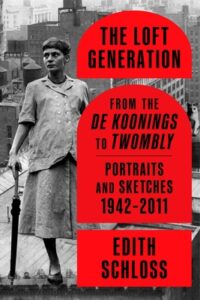
Edith Schloss, The Loft Generation
(Farrar, Straus and Giroux)
If you are even remotely interested in the idea of what it is to make a life from your art, Edith Schloss’s diaristic account of New York City’s post-war bohemia is indispensable reading. Assembled from the sprawling, memoiristic manuscript she put together before her death in 2011, The Loft Generation takes us into the spaces—studios and apartments both—of America’s legendary abstract expressionists, including but not limited to: Willem and Elaine de Kooning, Edwin Denby, Rudy Burckhardt, Fairfield Porter, John Cage, Frank O’Hara, Lee Krasner, Tom Hess, Larry Rivers, Giorgio Morandi, Meret Oppenheim, Francesca Woodman, and Cy Twombly. It is remarkable and engrossing reading, and offers a portrait of a New York City that seems impossible to imagine today: an affordable place for a struggling artist to live. –Jonny Diamond, Lit Hub Editor in Chief
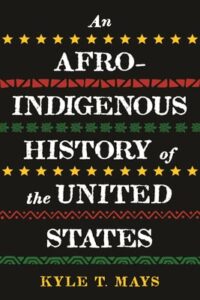
Kyle T. Mays, An Afro-Indigenous History of the United States
(Beacon Press)
The title alone gives an idea of the scope of this ambitious project: Kyle T. Mays chronicles U.S. history through the lens of Afro-Indigenous identity, reaching back to the pre-colonial origins of the country and the extended story of how people in power have attempted to erase that identity. Mays, a Black and Saginaw Anishinaabe writer and assistant professor at the University of California-Los Angeles, clarifies from the outset that his project is to discuss both “the intersecting relationship between Black American and Native American peoples and those who identify both as Black and Indigenous.” To address this history in writing means countering the myths and racist attitudes that have misconstrued so much of it, while also managing the burden of validating its existence inside the academy itself; there, he writes, skeptics have discouraged him from pursuing the connections between Indigenous and Black communities. This book covers their early history in the U.S., their relationships to government and other systems of power, and how that history resonates today in debates about politics, language, and cultural production. Mays’ approach combines an academic’s understanding of historical research and detail with the warm, conversational voice of a writer who really wants you to understand. –Corinne Segal, Lit Hub Senior Editor
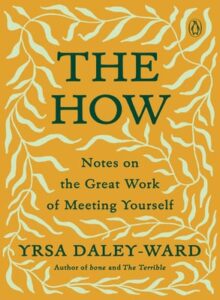
Yrsa Daley-Ward, The How: Notes on the Great Work of Meeting Yourself
(Penguin Books)
Yrsa Daley-Ward first captured my attention with her striking collection bone (2017). Here was a poet who could strip emotions down to their earthy core, who could speak to the unnameable mysteries of the human condition. Her voice burrowed itself in my head, as crisp and definite as the striking of a match. Daley-Ward’s new book serves as a self-care resource and instructional writing guide. Make no mistake—Daley-Ward doesn’t take on the position of Goop-approved guru to masquerade materialism and consumerism as wellness. The How: Notes on the Great Work of Meeting Yourself shapes the labored process of self-actualization into a poetic journey of enlightenment.
Readers learn how to take control of their fears and anxieties, ultimately reclaiming the parts of themselves that have been sacrificed to the unrelenting demands of our modern capitalist society. Before the introduction, definitions of “the How” include the mythical, the practical, the material, the spiritual, and the sustainable. Daley-Ward seems most interested in the last definition, which is “a loose and shifting guide toward even more of what you are.” Each concise chapter opens the space for conversation and encourages an active reading experience in order to begin the task of personal excavation. The act of dreaming is viewed as essential to survival and imagination should be fiercely protected. Both are integral to the cultivation of joy. It’s so easy to get caught up in the frenzy of trying to be seen and in The How, Daley-Ward reminds us that existence is not the same as living. To truly live is to move like water. –Vanessa Willoughby, Lit Hub Assistant Editor
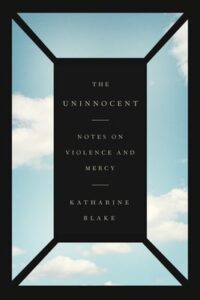
Katharine Blake, The Uninnocent: Notes on Violence and Mercy
(FSG Originals)
Katharine Blake’s The Uninnocent is not a black-and-white portrait of a murder. In this deeply thoughtful meditation on trauma, justice, and heartbreak, Blake details the emotional reckoning that followed after her 16-year-old cousin Scott killed a nine-year-old boy with a box cutter. We often think we know what we’d do if tragedy struck close to home, but we can never know for sure until it happens to us. In the aftermath of death, who do we become? What is destroyed, and what fills its absence? Blake, who was a law student at the time of Scott’s crime, captures the seemingly surreal feeling of being directly touched by violence. Forced to question her entire belief system, she considers the complications of the legal system and its failures to help both the guilty and the innocent. Blake’s quest to make sense of the senseless leads her to seek answers in science, history, literature, and philosophy as she differentiates between fairness and justice. On the surface, the scope of such inquiry appears to be a monstrous burden, but Blake’s incisive prose smoothly moves from one complexity to another, finding hope and humanity in the darkness. The Uninnocent does not offer simple answers or tidy solutions. For Blake, the conscious act of mercy lives in the space between absolutes. –Vanessa Willoughby, Lit Hub Assistant Editor

Debby Applegate, Madam: The Biography of Polly Adler, Icon of the Jazz Age
(Doubleday Books)
In the follow-up to her 2007 Pulitzer Prize-winning biography of Henry Ward Beecher, Debby Applegate takes on the life and times of Polly Adler, the Belarussian Jewish immigrant-turned-Jazz Age madam who presided over “New York’s most opulent bordello” and kept company with the city’s elite (including, memorably, quite a few members of the Algonquin Round Table). Applegate treats Adler’s remarkable life with the joyful spirit it demands. She gets up close to the action, collapsing the historical distance between the reader and the book’s world. Madam is novelistic in both its scope and ambition, and most of all, it’s an incredibly fun read. It’s not only a balm for the gossip-starved among us (sure, the gossip might be nearly a century old, but I’ll take Cafe Society scandals over Book Twitter dust-ups any day of the week), it’s also a fascinating portrait of the glamorous, corrupt world of New York nightlife in the 1920s. –Jessie Gaynor, Lit Hub Senior Editor

Donald Cohen, Allen Mikaelian, The Privatization of Everything: How the Plunder of Public Goods Transformed America and How We Can Fight Back
(The New Press)
Sometimes you just need to read a book that absolutely enrages you. Or, even better, a book that validates and contextualizes your rage, and outlines steps toward a less enraging system. In The Privatization of Everything, Donald Cohen and Allen Mikaelian dig into the distinctly American practice of privatizing necessary public services, from the water supply to the library. They look at the origins of the practice (Milton Friedman, white supremacy), its myriad and disastrous current manifestations and consequences (the shredding of a social safety net, out-of-control healthcare costs, skyrocketing income inequality, etc., etc., etc.), and—crucially—what is to be done. As the authors note in their introduction, the pandemic has underscored the necessity of public control over public goods, yet the myth of the superiority of privatization is remarkably persistent (which, as someone who has spent hours and hours on the phone with my health insurance company, I find utterly baffling). At the end of the book, Cohen and Mikaelian lay out six steps toward a society rooted in public values, which I hope everyone with a vested interest in forestalling the apocalypse reads. This is a far-reaching, comprehensible, and necessary book. –Jessie Gaynor, Lit Hub Senior Editor
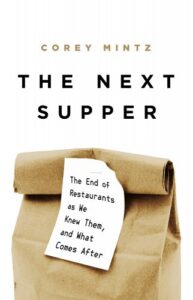
Cory Mintz, The Next Supper: The End of Restaurants as We Know Them
(PublicAffairs)
Mintz’s new book is an exploration of how we can eat ethically at restaurants, considering the pandemic, food production and distribution, and labor rights. He points to the ridiculous fallacy of “the customer is always right.” In fact, according to Mintz, “if there is a single guiding principle that applies to everything in the past year […] it is this.” Because the notion that “our money gives us the right to services and productions beyond those that a restaurant explicitly offers” is a direct line toward unfair and unforgiving work environments for restaurant workers. Especially in the pandemic, with mortality rates some of the highest for restaurant line cooks, such a demand falls into an even more dangerous light. The the ultimate quest for the book then is “how to eat restaurant food and not be an asshole.” Which, yes, 100 percent. –Snigdha Koirala, Lit Hub Editorial Fellow

Stan Cox, The Path to a Livable Future
(City Lights)
There are many great things about Stan Cox’s very optimistically titled guide for surviving capitalism’s ongoing apocalypse… But perhaps the most important thing is his recognition of the all-important coalition that has arisen over the last decade among those most affected by the impacts of climate change, a loose alliance of Black and Indigenous activists, people of color, and everyone—rural and urban—on the economic margins of America’s consumption-dependent culture. These are the everyday heroes who understand that the apocalypse has been with us for a while, and that inaction is not an option. But Cox goes well beyond a critique of late capitalism and offers solutions that might seem radical to some, but are urgent and possible. (Everyone in Congress should get a copy of this book.) –Jonny Diamond, Lit Hub Editor in Chief
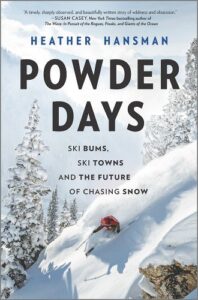
Heather Hansman, Powder Days
(Hanover Square Press)
Powder Days is an absolutely rollicking, unfiltered account of American ski bum culture, from its post-WWII origins with the 10th Mountain Division cutting out mountain trails and building lifts, through the epoch-changing turmoil of 1960s counterculture, to its declining and decadent days in the late 80s and early 90s. But not only does Hansman offer an engaging history of the subculture and its evolution from eccentric pastime to leisure-time scene of the rich, she recounts in revealing detail her own ski-bum story, from the humble hills of New Hampshire’s White Mountains to the dizzying class divides of Colorado’s luxury resorts. A great read to get you excited about winter. –Jonny Diamond, Lit Hub Editor in Chief



















